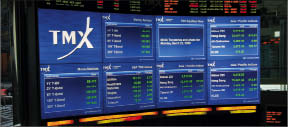As alternative investment platforms continue to take business from traditional stock exchanges, the London Stock Exchange Group (LSE-L) and TMX Group (X-T) are looking to stem the tide by creating their own global trading juggernaut.
But before such a vision can be realized, the two companies will have to clear the hurdle of nationalistic attachment which has already begun to rear its head in these early days of the deal.
While the federal government in Canada has been reviewing the deal and has had no official pronouncement, both the provincial governments of Quebec and Ontario have expressed fears about London taking too much control of trading platforms in Toronto and Montreal.
To address such challenges, Xavier Rolet, chief executive of the LSE was looking to get out in front of the issue by selling the merger as a benefit to Canadian firms.
“London is the largest resource pool of capital and one of the most diversified financial centres there is. This is a unique opportunity for Canada to market and distribute its products into the world via London,” Rolet said on a conference call.
But make no mistake, this deal, like any other in the financial markets, is motivated less by goodwill and more by the bottom line.
Some reports have the two companies losing as much as 64% of market share over the last few years to alternative trading platforms such as Chi-X Europe and Bats Europe. Alternative trading platforms are increasingly favoured by some companies and institutional investors as they can offer cheaper listing prices, better trading prices and some tax advantages.
But the rise of the alternatives is only part of the story. The proposed merger is also unfolding in an environment where consolidation amongst senior exchanges is a major theme.
In January the Shanghai exchange announced its intent to acquire Australia’s largest exchange, ASX, and word of the proposed merger between the LSE and TMX sparked Deutsche Boerse (DBOEY-Q) to announce a bid for NYSE Euronext (NYX-N)with the acquirer owning 60% of the ensuing merged company.
Rolet acknowledged such competition on the conference call.
“We all know where the leaders (of financial trading) are based. They are just slightly south of this border, and there’s a few on the other side of the pond,” he said. “So we need to structure ourselves in a way that we can be powerful and competitive… and we are very confident of our ultimate success.”
The market seemed to agree with his sentiment as the proposal announcement sent LSE shares up 8% while TMX Group was up 6% or $2.27 to $42.55 on roughly 7 million shares traded.
It’s a sign that investors are buying into the thesis that in financial trading, size really does matter, and the groups that can offer investors the most options, and companies the greatest depth of capital, will persevere while those that cannot will fall into irrelevance.
Not to be lost in the shuffle is the fact that a successful deal would create the single largest platform for mining company listings.
What that means to Canadian investors is that they will have access to a wider array of stocks and other financial instruments, such as derivatives and fixed income.
In more practical terms, a mining stock that is currently only listed on London’s AIM exchange would now be available for trading from any retail account here in Canada.
Other significant details are that the combined group would have a dual stock market listing, would be jointly headquartered in London and Toronto and would be the world’s largest exchange in terms of the number of companies traded, with 6,700 listings.
Both Rolet and Kloet assured listeners to the conference call that Montreal would not be lost amidst the changes. They said Montreal would, if anything, gain in stature, as it would be the centre for global derivative trading of the new group.
Rolet would serve as chief executive of the new company with Kloet stepping in as president and Wayne Fox, chairman of TMX Group, serving as chairman.
And while the key management positions have been decided upon, a name for the new group has not.
“With regards to the holding company’s name… we haven’t come up with it yet,” Kloet said. “It’s not been the primary focus because we believe we already have such value in the TSX and LSE brands.”
To complete the deal TMX investors would get 2.9963 shares in the enlarged group for each TMX share held. LSE shareholders will own 55% of the new group with TMX shareholders holding the remainder.
As for synergies, the companies said the new group could see cost savings of $56 million by the end of the second year with revenues climbing by $56 million in the third year and then $100 million in the fifth.
“The revenue synergies, Xavier (Rolet) and I think, are achievable and realistic expectations,” Kloet said. “The businesses we operate are complementary without overlapping in many ways and we each have our own inherent strengths that we can deliver to the global market.”


Be the first to comment on "LSE-TMX: a powerful platform for mining stocks?"